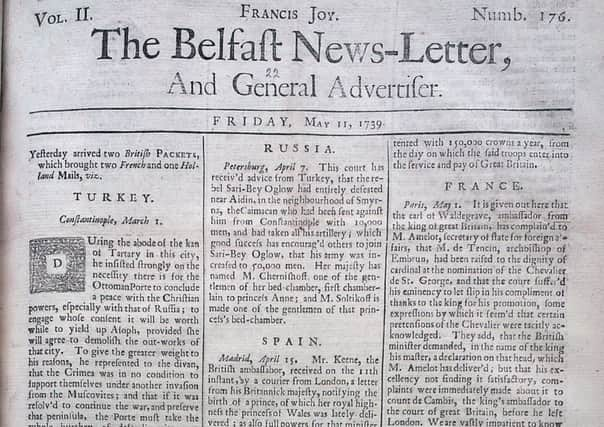Reported On This Day 280 Years Ago (May 22 1739): Black man is burned to death for murdering a child


New-York, Jan. 9.
From Rooky-Hill in Somerset, New Jersey, we hear that a negro man of Robert Hooper, Esq; being ordered by the overseer’s wife to bring in some wood and make, he replied, in a surly tone, that he would make fire enough, and pursued her with an ax: to avoid his fury she fled to the house, and shut the door on herself; but in the hurry she unhappily lock’d her little son out, him the negro struck so that the whole breadth of the bit on the ax enter’d the cavity of the body, between the shoulders and the neck, so as to wound the pericardium, and afterwards mangled him by other blows; then he immediately set fire to Mr. Hooper’s barn, in which there were about 1000 bundels of grain, and then endeavoured to escapee; he was soon taken and tried, and on the third day executed by fire.
New-York, Jan. 30.
We are inform’d that nine thousand Germans have transported themselves from the Rhine this last summer for Pennsylvania.
Advertisement
Hide AdAdvertisement
Hide AdWe are informed from New-Brunswick in New-Jersey, that two men near that place having had some words together, one of them told the other, that he would be reveng’d on him by setting his house on fire, and accordingly he took his opportunity and set the four corners of the house on fire; at which time two young children were in the house alone, upon whom he bar’d the outside of the doors so that they could not get out. The man seeing his house on fire, and his children in it, got into it, and took his children up in his arms; and as he was carrying them out, a beam, that was burnt thro’, fell down and struck the ppor children out of their father’s arms; and the flames being very furious, he was obliged to leave his children to save his own life.
Newport, Rode-Island, Feb. 23.
On the 17th of January last arrived here Peter Bourse, Esq; with the rest of the proper officers that went by our authority to Block-Island, to inspect into the affairs of those poor distressed people the Palatines, by whom we are informed as follows.
That the Ship mentioned in our last print stranded upon Block Island, being chiefly owned by persons belonging to Ramsgate in England, and commanded by Georg Long, left Plymouth sometime in August, bound for Philadelphia, with about 400 Palatines on board, which they took in at Rotterdam: that an exceeding bad fever and flux prevailed among them; that about 105 were landed upon Block-Island; and that since their arrival there, their illness continuing, their number is reduced to about 90. Capt. Long, with several of the mariners died on the passage.
The chiefest reason assign’d for so great a mortality, is the badness of their water taken in at Rotterdam in casks that had before entertained white and red wines.
Advertisement
Hide AdAdvertisement
Hide AdThe hull of the ship, (which had no cargo in belonging to the owners of her) together with the chiefst part of the goods of the Palatines, are entirely lost in the sea; great care has been taken by the authority, that what is saved by may be secured for the benefit of those surviving distressed people; many of whom it is said left their country purely to enjoy their religious privileges in America.
[The German Palatines were from the Middle Rhine region of what was then the Holy Roman Empire. They were Protestant and Catholic]
New York, Feb. 12.
Extract of a letter from St. Eustatia, dated Jan. 12.
Two days ago a French trading sloop from the Spanish coast touched here laden with Cocoa, and having twenty thousand pieces of eight on board; on the coast of Carracas she met with two Spanish gallies of twenty guns each, which she engag’d for twelve hours, and at last obliged them to give over.
You must think she was very much shatter’d, so that she came up to St. Thomas to refit, and went down again to complete her trade, and meeting a Spanish guards costa, she sunk him.’
Advertisement
Hide AdAdvertisement
Hide AdThey write from Vigo in Spain, That some fishermen lately took on that coast a sort of monster, or mernan, five foot and a half from its foot to its head, which is like that of a goat.
It has a long beard and mustachoes, a black skin, somewhat hairy; a very long neck, short arms, and hands longer and bigger than they ought to be in proportion to the rest of the bod; long fingers, like those of a man, with nails, like claws; very long toes join’d like the feet of a duck, and the heels furnished with fins resembling the winged feet with which the painters represent Mercury.
It has also a fin at the lower end of its back, which is 12 inches long and 15 or 16 broad.